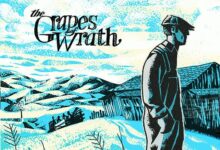
Holden could be annoying if he weren’t a teenager but a middle-aged man. This main character in The Catcher in the Rye can’t stand the sight of anything. He hates school, he hates his classmates, he hates his parents. He even hates people who like to say “good luck,” people who say “nice to meet you,” and people who applaud unquestioningly at piano recitals. And, of course, he hates math, physics, geography, history, and everything else except writing. Having someone who can’t even take pleasure in learning isn’t charming.
The point is that there is no “social cause” for his misery. Living in his time and country, he can neither complain about the “authoritarian society that distorts human nature” nor the “stupid test-based education.” He just trivially hates those trivial things.
But all this whining can be tolerated and even applauded in the name of “innocent teenagers rebelling against the repressive social order” – it is said that many teenagers in the United States later deliberately imitated Holden – because he was a teenager. -Because he was a teenager. Under the cover of youth, decadence was courageous, laziness was defiant, and emptiness was sexy. For a while, there was even a genre name for this kind of literature, “Cruel Youth”. There is no better word: what does it mean to be a cruel youth? Isn’t old age cruel? It’s so cruel that people don’t even bother with it. Is childhood cruel? Cruel to the children is unable to express its cruelty. Not to mention the unlucky middle age, which is cruel to all the cruelty attributed to its cruelty, so when it comes to cruelty, youth are not that sad; they can be at the bottom.
But maybe Catcher in the Rye isn’t just a young adult novel. It’s a novel about a man who sees that life is doomed to failure and how he convinces himself to be patient through that failure. In the book, Holton, a middle school student, wonders: what’s the point of studying hard? To become smart. And what’s the point of being smart? To get a good job. And what’s a job for? To buy a Cadillac. What’s a Cadillac for? God knows.
Of course, he could have pursued other things: knowledge, literature, music, sitting on the edge of the bed talking to his beloved, and wondering “where the ducks go in Central Park in the winter.” But by pursuing these, he is moving away from anger, and anger – and only anger – is the quickest way to perceive oneself.
The “society” Holden faces isn’t repulsive when you think about it. Neither his roommate nor his girlfriend nor his teachers seem to be dark forces, just a bunch of “not bad” people. If the author had written them in the first person, it would have been the same story. But perhaps the worst thing about this society is that it’s not even that bad – these not-so-bad people, in their not-so-badness, ruthlessly disqualify Holden from being angry, and anger – or at least rage – is the most important way a person can perceive himself. – is the quickest way for a person to perceive his or herself.
The world is a whole of Holdens: 16-year-old Holdens, 30-year-old Holdens, 60-year-old Holdens. They see through the world’s mediocrity but are incapable of rising above it. They are incapable of being “I,” but they don’t care to be “he.” They feel pain, but really, even that pain is banal – how many people in the world see through the futility of life and feel an anger that has long been insufficiently personal, insufficiently comforting. Since anger has become fashionable, it’s downright contemptible.
So, the great paradox of The Catcher in the Rye is escape. On the one hand, Holden longs to escape to the West, to pretend to be deaf and mute, and to be done with his life; but on the other hand, he wants to be the Catcher in the Rye, to stop the children, who may fall into nothingness at any moment. In the whole novel, what touches me most is not the classic conversation about the “wheat field” but another scene: Holden is exhausted after two days of wandering, and when he crosses the street, he seems to sink infinitely with every step he takes, and then he thinks of his dead brother, Avery. In his mind, he says to Avery, Dear Avery, don’t let me disappear, don’t let me disappear, please don’t let me disappear.
I think Holden may not be angry, and he’s just afraid. He was afraid of his empty life, and we always express fear as arrogance out of pride. He also loves novels and music, and he also loves the smile on his little sister Phoebe’s face. In the end, maybe it’s not because of weakness that Holden didn’t go west, because even if he did, he’d still have to find a job, he’d still have to go to the grocery store and buy three pounds of potatoes for a dollar, and he’d still be surrounded by countless people who would love to say, “It was nice to meet you,” and “Good luck. I’m not sure if I will be able to do that. Instead of going to a faraway place to rely on freedom that doesn’t exist, it’s better to discover the parts of life that you can still look forward to – the music of the novel and the smile of your little sister – and treat the inch of time that stops in the palm of your hand because you’re lost, and then close your eyes when the doomed failure comes from the other side of the tracks, and then hula, hula, and then disappear cleanly.

 Essays on CLassic
Essays on CLassic


